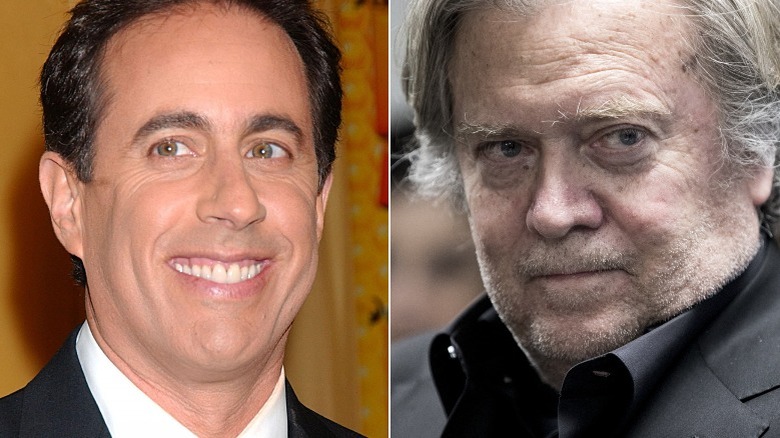Inside Steve Bannon's Surprising Connection To Seinfeld
At one point, former chief strategist Steve Bannon was one of former President Donald Trump's closest allies. Bannon was alongside Trump until his firing in 2017 — although it apparently left no hard feelings between the two, as Trump later pardoned the fraud charges against Bannon at the end of his presidential term in January 2021, per CNN.
In August 2020, nearly three years after his time at the White House abruptly ended, Bannon was arrested and charged for scamming people who financially supported Trump's goal of constructing a wall at the Mexico border. The Manhattan U.S. Attorney's Office alleged Bannon used a nonprofit organization to siphon funds and "received over $1 million" for personal gain from the "We Build the Wall" online campaign. The prominently known political adviser was eventually dismissed of all charges, four months after Trump's last-minute pardon, according to Forbes — who states organizers of the wall scheme raised more than $25 million overall.
It's clear Bannon has been involved in some big investments and financial schemes throughout his time in the political spotlight, but the former staff member to the president hasn't been clear about how much he's made from taking a chance with one of America's most profitable shows — "Seinfeld."
How Seinfeld quickly made Steve Bannon rich
Steve Bannon struck gold when he invested in the hit '90s sitcom "Seinfeld" — which centered around comedian Jerry Seinfeld living life and enduring ridiculous moments with his pals in New York. According to Film Daily, it all began when his investment firm, Bannon & Co., was hired by the tandem of Castle Rock Entertainment, the company producing "Seinfeld," and Westinghouse, which had purchased 15% of stake in Castle Rock. At the time, Bannon advised them not to cancel the show.
It was a financial score for Bannon. Although his exact earnings for believing in the show aren't exactly known, it's estimated Bannon's likely earned around $31 million if he owned just 1% of rerun expansions, according to the outlet.
It seems Bannon's investment continues to be a win as the American sitcom, which aired from 1989 to 1998, profited around $200 million a year by its final season, per Time. Even decades later, fans are clamoring for "Seinfeld" and streaming platforms are listening. The chairman of Warner Brothers Entertainment, Barry Meyer, voiced that the show raked in $2.7 billion from 180 episodes of reruns in 2010. Then, in September 2019, Netflix paid a hefty $500 million-plus for exclusive rights to "Seinfeld" after losing "Friends" and "The Office" to other high-bidding platforms, which are viewing classic television shows as crucial weaponry, per The Hollywood Reporter.
How Jerry Seinfeld feels about Steve Bannon's earnings
It seems as if Jerry Seinfeld doesn't care about Steve Bannon's big profits from "Seinfeld." At the 2017 New Yorker Festival, Seinfeld said, "[T]here are dozens and dozens of investors and people that you never meet or know about" (via The Hollywood Reporter). Seinfeld added the iconic show deals with "giant multinational corporations" like NBC and it's tough for him to have issues with any of the faceless investors involved behind the scenes. The actor has clarified he personally didn't know that Bannon made a sizable chunk of change from the sitcom he helped create in the late '80s.
It's no secret the comedian himself made some massive earnings. By 1998, the show earned the comedian a soaring $267 million. And it only goes up from there — by the show's ninth and final season, the actor was raking in $1 million per episode. To date, Seinfeld has generated several billion dollars in syndication revenue from the sitcom and, at the time of writing, has accumulated the comedian estimated net worth of $950 million, according to Celebrity Net Worth.



